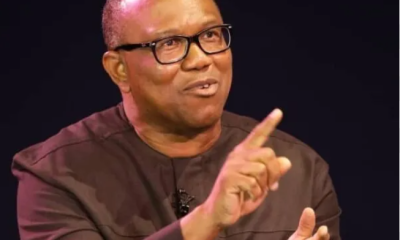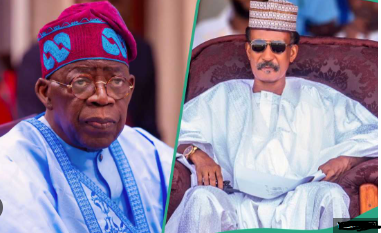Comments and Issues
Lying and Leadership
Published
10 years agoon
By
Olu Emmanuel
By JOSEPH S. NYE
THIS election season has been marked by frequent charges of dishonesty. During Britain’s “Brexit” debate, each side charged the other with distorting the truth, though the speed with which the “Leave” camp has been disowning its campaign promises, and the “Remain” camp’s claims have come true, suggests which was telling it like it is. In the United States’ presidential election campaign, Donald Trump, the presumptive Republican nominee, seldom referred to his closest competitor in the primaries without calling him “Lying Ted Cruz.”
Similarly, Trump rarely misses an opportunity to refer to Hillary Clinton, the presumptive Democratic nominee, without attaching the prefix “Crooked.” When she recently delivered a careful speech on foreign policy, Trump responded by calling her a “world-class liar.” But, according to PolitiFact, a Pulitzer prize-winning organization that checks the veracity of political statements, 60% of the claims by Trump that it investigated since he began his campaign have been deemed false or “Pants on Fire” false, versus 12% for Clinton.
Some cynics shrug off such exchanges between candidates as typical behavior by politicians. But that is too facile, because it ignores serious questions concerning how honest we want our political leaders and our political discourse to be.
In fact, we may not want our political leaders to tell the literal truth all the time. In wartime or during a counterterrorism operation, deception may be a necessary condition of victory or success which clearly is in our interest.
Other cases are less dramatic but no less important. Sometimes, leaders have objectives that differ from those of a large part of their followers; rather than revealing the differences, they deceive their followers. When such actions are self-serving, as in cases of corruption or narcissistic ego gratification, moral censure is easy and appropriate. In contrast, other leaders with different objectives from their followers invest heavily in educating those who would oppose them to a different point of view.
In some instances, leaders find it impossible to educate their followers adequately in time, or their followers are too deeply divided to reach a consensus that will sustain collective action.
ALSO SEE: Crisis of diminishing returns on leadership
In such circumstances, some leaders may take a paternalist view and decide to deceive their followers for what they see as their larger or later good.
For example, as Senate Majority Leader, Lyndon B. Johnson deceived his southern supporters in order to pass the 1957 civil rights act. Charles de Gaulle did not reveal his strategy for Algerian independence when he came to power in 1958, because he knew that doing so would doom it to failure. John F. Kennedy misled the public about the withdrawal of US nuclear warheads from Turkey in the deal that peacefully ended the Cuban Missile Crisis in 1962.
Moreover, Franklin D. Roosevelt lied to the American public about a German attack on a US destroyer, in an effort to overcome isolationist resistance to helping Britain before World War II. And Winston Churchill once said that the truth may be “so precious that she should always be attended by a bodyguard of lies.”
The fact that leaders’ ends may sometimes justify violating norms about honesty does not mean that all lies are equal, or that we must suspend our moral judgment in such cases. Machiavellian deception is often part of a strategy, for example, in bargaining or even in bringing a group to accept new goals. But intentions matter. Deception that is purely self-serving turns from a strategy that may benefit others into selfish manipulation.
Even if one admits that deception may sometimes be necessary, one can still ask about the importance of the goal, the availability of alternative means to achieve it, whether the deception is likely to spread through precedent or example, the damage done to various victims, and the deceivers’ accountability (whether their behavior can be discovered and explained later). In his book, When Presidents Lie, the historian Eric Alterman concludes that presidential lies “inevitably turn into monsters that strangle their creators.”
And presidents may set bad precedents. When Roosevelt lied about the German attack on the destroyer Greer in 1941, he set a low bar for Johnson’s highly embellished description of a North Vietnamese attack on US naval vessels, which led to the Gulf of Tonkin Resolution of 1964.
It is all too easy for leaders to convince themselves that they are telling a noble lie for the good of their followers, when in fact they are merely lying for political or personal convenience. That makes it all the more important in a democracy that we carefully examine the nature of the tradeoffs between ends and means that leaders make. There may indeed be situations where we would approve a political leader telling us a lie, but such cases should remain rare and subject to careful scrutiny. Otherwise, we debase the currency of our democracy and lower the quality of our political discourse.
This is why it is a mistake for cynics to shrug off Trump’s rhetoric as simply one of the things politicians do. If PolitiFact and other similar organizations are correct, politicians are not all the same when it comes to lying. Trump has made many more false statements than any of his opponents, and few (if any) could pass the test of not being self-serving. An independent and vigorous press that checks the truth is crucial to preserving the integrity of democracy; but so is an electorate that resists cynicism and the debasement of political discourse.
• Joseph S. Nye, Jr., a former US assistant secretary of defense and chairman of the US National Intelligence Council, is University Professor at Harvard University. He is the author of Is the American Century Over?
You may like


El-Rufai rules out 2027 ambition, Says He’s back to mentor youth, Support credible leadership


Peter Obi: I never commissioned projects as governor, Focused on service over self-promotion


Breaking: Muhammed Babangida dismisses appointment rejection report, Accepts BOA chairmanship


Muhammed Babangida declines appointment as Bank of Agriculture Chairman


Tambuwal lauds Peter Obi on 64th birthday, Hails His ‘Integrity, Discipline, and Service’ in politics


My CFR National Award- Col Abubakar D. Umar(Rtd)
Trending

 Health5 days ago
Health5 days agoDeclassified CIA memo explored concealing mind-control drugs in vaccines

 Entertainment7 days ago
Entertainment7 days agoSimi addresses resurfaced 2012 tweets amid online backlash

 Crime6 days ago
Crime6 days agoSenior police officers faces retirement after Disu’s appointment as acting IGP

 Education1 week ago
Education1 week agoPeter Obi urges JAMB to address registration challenges ahead of exams

 Health1 week ago
Health1 week agoNAFDAC issues alert on suspected revalidated SMA Gold infant formula

 Comments and Issues7 days ago
Comments and Issues7 days ago20 Critical Fixes to Save Nigeria’s Democracy from Electoral Fraud

 Football7 days ago
Football7 days agoMartínez ruled out of Everton clash with calf injury

 Latest6 days ago
Latest6 days agoICPC yet to respond to El-Rufai’s bail request as arraignment date looms

